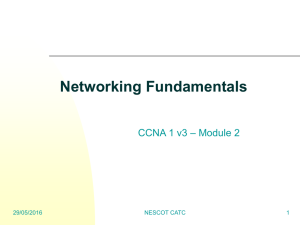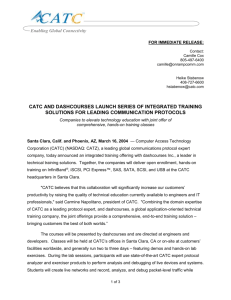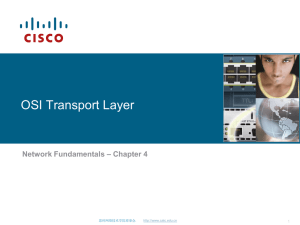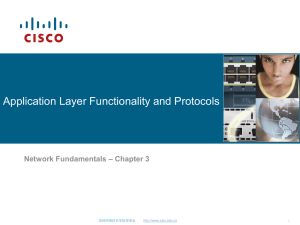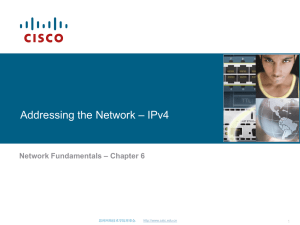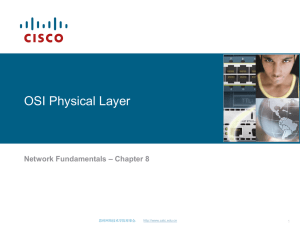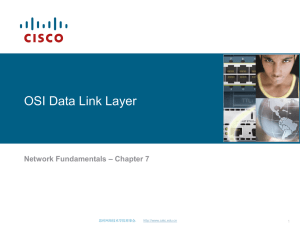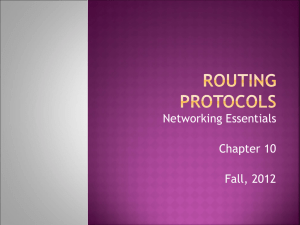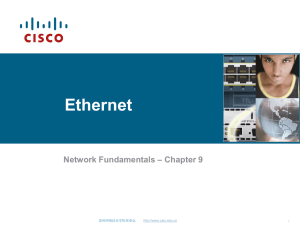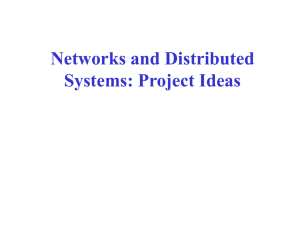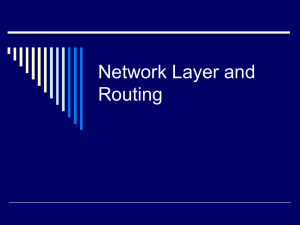OSI Network Layer
advertisement
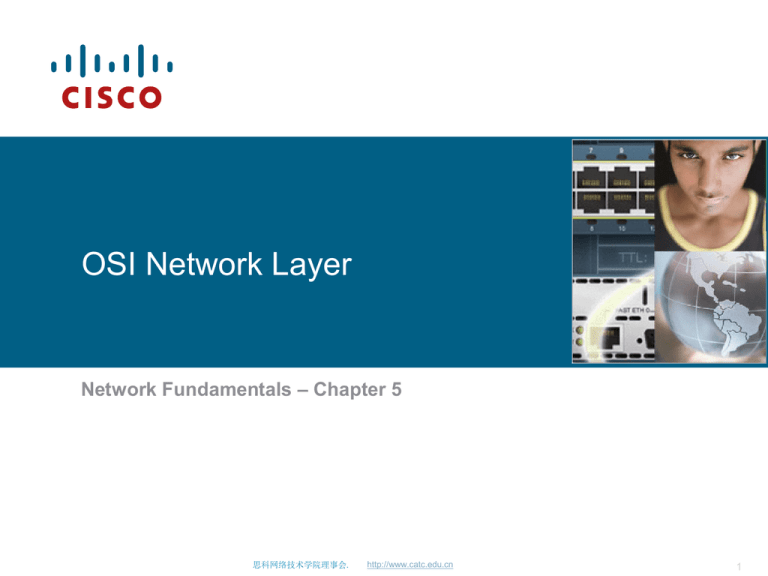
OSI Network Layer Network Fundamentals – Chapter 5 思科网络技术学院理事会. http://www.catc.edu.cn 1 Objectives Identify the role of the Network Layer, as it describes communication from one end device to another end device Examine the most common Network Layer protocol, Internet Protocol (IP), and its features for providing connectionless and best-effort service Understand the principles used to guide the division or grouping of devices into networks Understand the hierarchical addressing of devices and how this allows communication between networks Understand the fundamentals of routes, next hop addresses and packet forwarding to a destination network 思科网络技术学院理事会. http://www.catc.edu.cn 2 Course Index 5.1 IPv4 5.2 Networks – Dividing Hosts into Groups 5.3 Routing – How Our Data Packets are Handled 5.4 Routing Processes: How Routes are Learned 5.5 Lab Activities 思科网络技术学院理事会. http://www.catc.edu.cn 3 5.1 IPv4 思科网络技术学院理事会. http://www.catc.edu.cn 4 5.1.1 Network Layer – Communication from Host to Host Network Layer Provides services to exchange the individual pieces of data over the network between identified end devices Basic process: Addressing Encapsulation Routing Decapsulation Protocols Internet Protocol version 4 (IPv4) Internet Protocol version 6 (IPv6) Novell Internetwork Packet Exchange (IPX) AppleTalk Connectionless Network Service (CLNS/DECNet) 思科网络技术学院理事会. http://www.catc.edu.cn 5 5.1.2 The IPv4 Protocol Role of IPv4 It is used to carry user data over the Internet 思科网络技术学院理事会. http://www.catc.edu.cn 6 5.1.3 The IPv4 Protocol – Connectionless Connectionless Service 思科网络技术学院理事会. http://www.catc.edu.cn 7 5.1.4 The IPv4 Protocol – Best Effort Best Effort Service (unreliable) 思科网络技术学院理事会. http://www.catc.edu.cn 8 5.1.5 The IPv4 Protocol – Media Independent Media independent Maximum Transmission Unit (MTU):the maximum size of PDU that each medium can transport. fragmenting the packet or fragmentation: the process of an intermediary device usually a router - will need to split up a packet when forwarding it from one media to a media with a smaller MTU 思科网络技术学院理事会. http://www.catc.edu.cn 9 5.1.6 IPv4 Packets – Packaging the Transport Layer PDU IPv4 encapsulates, or packages, the Transport layer segment or datagram so that the network can deliver it to the destination host. The encapsulated Transport layer PDU - remains unchanged during the Network layer processes. 思科网络技术学院理事会. http://www.catc.edu.cn 10 5.1.7 IPv4 packet header 思科网络技术学院理事会. http://www.catc.edu.cn 11 5.1.7 IPv4 packet header Typical IP Packet 思科网络技术学院理事会. http://www.catc.edu.cn 12 5.2 Networks – Dividing Hosts into Groups 思科网络技术学院理事会. http://www.catc.edu.cn 13 5.2.1 Networks – Separating Hosts into Common Groups Subnet Separating hosts into common groups The factors of group Geographic location Purpose Ownership 思科网络技术学院理事会. http://www.catc.edu.cn 14 5.2.2 Why Separate Hosts Into Networks? Performance Dividing large networks so that hosts who need to communicate are grouped together reduces the traffic across the internetworks. Broadcasts are contained within a network, so a network is also known as a broadcast domain. 思科网络技术学院理事会. http://www.catc.edu.cn 15 5.2.3 Why Separate Hosts Into Networks? Security Dividing networks based on ownership means that access to and from resources outside each network can be prohibited, allowed, or monitored. 思科网络技术学院理事会. http://www.catc.edu.cn 16 5.2.4 Why Separate Hosts Into Networks? Address Management Dividing large networks so that hosts who need to communicate are grouped together reduces the unnecessary overhead of all hosts needing to know all addresses 思科网络技术学院理事会. http://www.catc.edu.cn 17 5.2.5 How to divide networks? Hierarchical addressing 思科网络技术学院理事会. http://www.catc.edu.cn 18 5.2.6 Dividing the Networks – Networks from Networks IPv4 is a Hierarchical addressing 思科网络技术学院理事会. http://www.catc.edu.cn 19 5.3 Routing – How Our Data Packets are Handled 思科网络技术学院理事会. http://www.catc.edu.cn 20 5.3.1 Device Parameters - Supporting Communication Outside Our Network 思科网络技术学院理事会. http://www.catc.edu.cn 21 5.3.2 IP packet—carrying data end to end 思科网络技术学院理事会. http://www.catc.edu.cn 22 5.3.3 A Gateway – The Way Out of Our Network A router interface connected to the local network. When a packet’s destination is a different network, the packet is sent to the gateway. 思科网络技术学院理事会. http://www.catc.edu.cn 23 5.3.4 A Route – The Path to Network Three main features of route: Destination network Next-hop Metric Routing table Routing protocols. 思科网络技术学院理事会. http://www.catc.edu.cn 24 5.3.5 Destination network 思科网络技术学院理事会. http://www.catc.edu.cn 25 5.3.6 The Next Hop – Where the Packet Goes Next 思科网络技术学院理事会. http://www.catc.edu.cn 26 5.3.7 Packet Forwarding Forward it to the next-hop router Have a exactly entry No exactly entry but a default route exits Forward it to the destination host Direct connected network Drop it No entry and no default route 思科网络技术学院理事会. http://www.catc.edu.cn 27 5.4 Routing Processes: How Routes are Learned 思科网络技术学院理事会. http://www.catc.edu.cn 28 5.4.1 Routing Protocols Used for Sharing the Routes 思科网络技术学院理事会. http://www.catc.edu.cn 29 5.4.2 Static Routing Manually configured on the router 思科网络技术学院理事会. http://www.catc.edu.cn 30 5.4.3 Dynamic Routing Dynamic Routing protocols are the set of rules by which routers dynamically share their routing information. Common dynamic routing protocols: Routing Information Protocol (RIP) Enhanced Interior Gateway Protocol (EIGRP) Open Shortest Path First (OSPF) 思科网络技术学院理事会. http://www.catc.edu.cn 31 Summary 思科网络技术学院理事会. http://www.catc.edu.cn 32 思科网络技术学院理事会. http://www.catc.edu.cn 33
